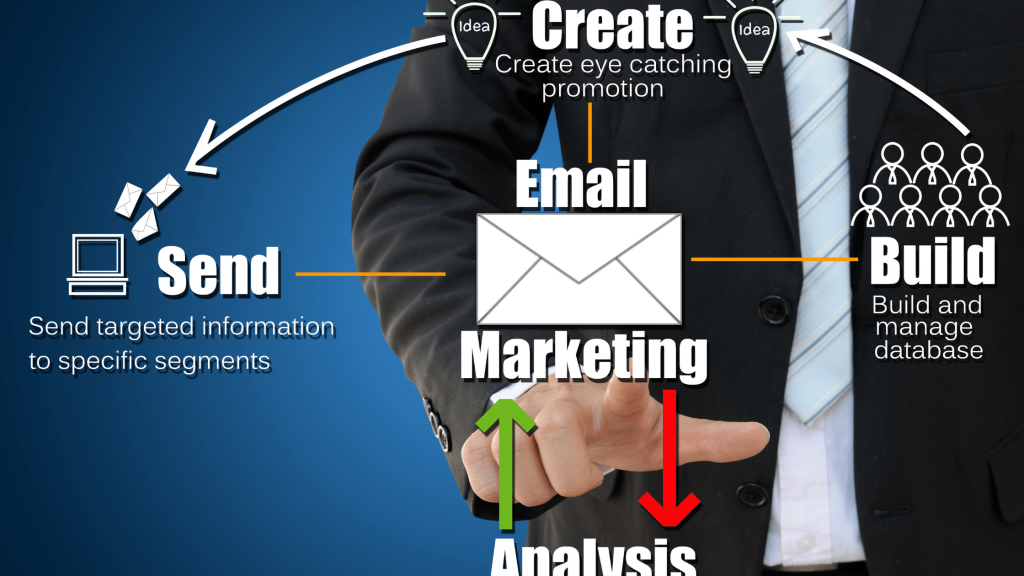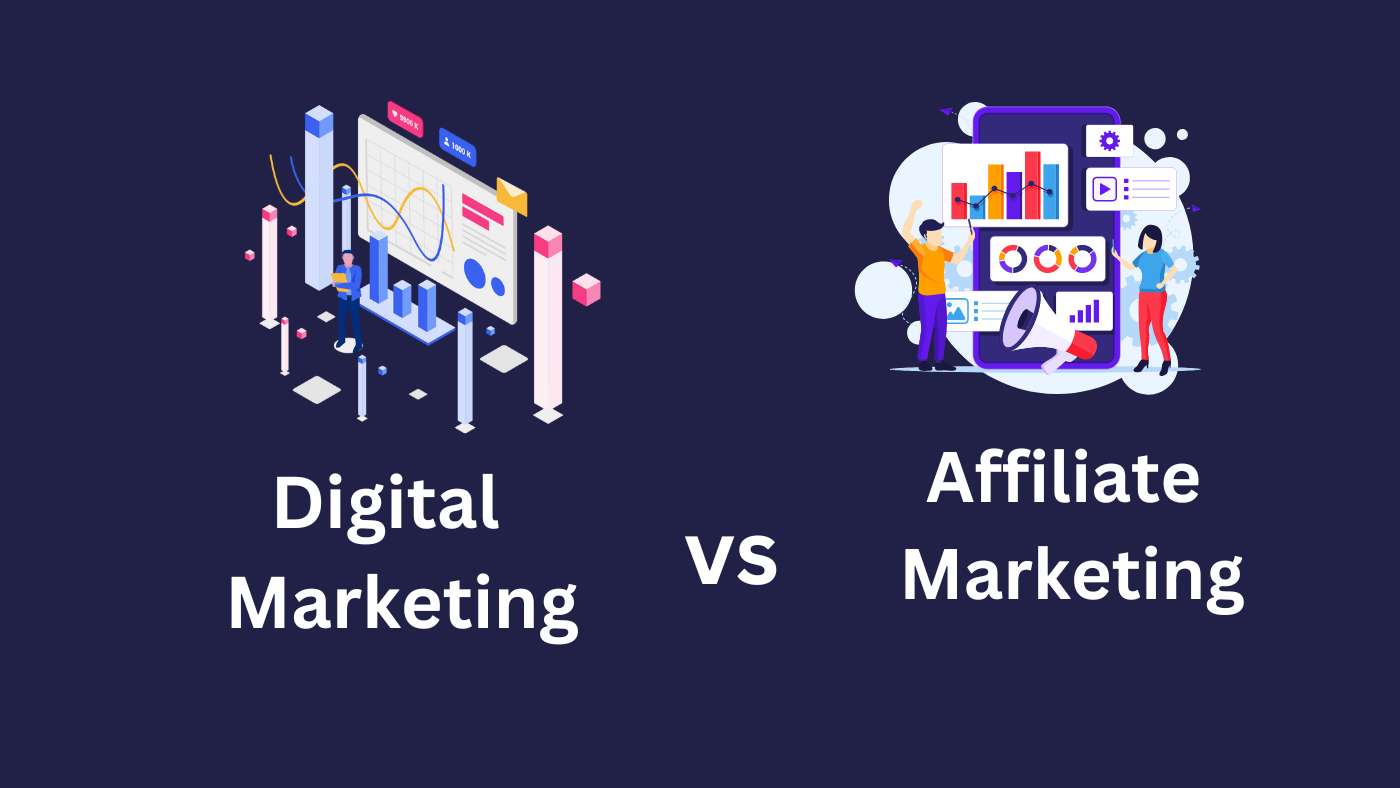In today’s digital age, traditional marketing methods have taken a backseat, giving way to more innovative and cost-effective techniques such as digital marketing and affiliate marketing. Both strategies aim to reach a target audience and promote products or services. There are fundamental differences between digital marketing vs affiliate marketing that set them apart.
We’re going to look at the difference between them, the definitions of what each means and how they relate to each other.
Let’s dive right in to help you make an informed decision.
Digital marketing vs Affiliate Marketing
What is the difference between digital marketing and affiliate marketing?
Digital marketing involves a wide range of marketing techniques and channels to promote product or services online to generate sales and spread your message.
On the other hand, affiliate marketing is a sub-category of digital marketing that depends on partnerships to promote products or services, offering a cost effective and performance-based approach.
The key difference here is that affiliate marketing relies heavily on third party individuals or businesses to promote products, unlike digital marketing, which is carried out directly by the brand or its marketing team.
What is Digital Marketing?

Digital marketing leverages various techniques and channels to promote products and services online. This includes Search Engine Optimization (SEO), Search Engine Marketing (SEM), Content marketing, Social Media Marketing (SMM), email marketing, influencer marketing and more.
With digital marketing, you can decide to sell your own digital or physical products at your own set price. Alternatively, you can also promote other people’s products or services for a commission at a percentage of the sale price.
The ultimate goal of digital marketing is to expand brand awareness, generate leads, and drive conversions for a business. It involves a holistic approach by utilizing multiple tactics simultaneously to create a comprehensive marketing campaign.
What are the Digital Marketing Channels?
In the ever-evolving digital marketing landscape, businesses have multiple channels at their disposal to connect with audiences, drive engagement and achieve their objectives. Here are some of the most used digital marketing channels:
Search Engine Optimization (SEO)
SEO is the practice of optimizing a website to enhance its visibility in search engine results organically. It involves various strategies to improve a site’s ranking and increase the likelihood of being found by users searching for relevant information. Some helpful SEO tools that you can use include Mangools, RankIq or SEMRush.
Key Strategies
- Keyword Optimization: Researching and strategically using keywords relevant to your content.
- Quality Content: Producing high quality, valuable content that aligns with user intent.
- Link Building: Earning backlinks from reputable websites to improve authority.
Benefits
- Increased Visibility: Higher rankings in search engines lead to increased visibility in search engine results.
- Trust and Credibility: Appearing on the first page of search results builds trust with users.
- Long-term Results: Effective SEO efforts can yield sustainable, long-term benefits.
Search Engine Marketing (SEM)
SEM involves paid advertising on search engines to increase to drive traffic and increase visibility. This often includes Pay-Per-Click (PPC) campaigns where advertisers pay a fee each time their ad is clicked. Some PPC advertising platform include Google Ads and Bing Ads.
Key Features
- Keyword Research: Identifying relevant keywords for targeting.
- Ad Creation: Designing compelling ads with clear call to action.
- Bid Management: Setting bids strategically to optimize ad placement.
Benefits
- Instant Visibility: Ads appear prominently in search results.
- Targeted Advertising: Precise targeting based on keywords and demographics.
- Measurable ROI: Performance metrics allow for detailed analysis and optimization.
Social Media Marketing (SMM)
Social Media Marketing involves leveraging social media platforms to connect with audiences, build brand awareness and promote products or services.
Key Features
- Content planning: Creating engaging content tailored to each platform.
- Community engagement: Interacting with followers and building an active community around your brand.
- Paid Advertising: It involves using paid ads on various social platforms to expand your reach such as Facebook ads or Twitter Ads.
Benefits
- Brand Exposure: Posting engaging content boosts brand visibility.
- Audience Interaction: Direct communication with your target audience fosters relationships and builds credibility.
- Targeted Advertising: Social media platforms offer detailed targeting options for ads.
Content Marketing
Content Marketing focuses on creating and distributing valuable, relevant content to attract and retain a defined audience. This content can take various forms including blog posts, videos, infographics, checklists and more.
Key Strategies
- Content Strategy: It involves planning and aligning content with your business goals.
- SEO Integration: Incorporating keywords for search engine visibility.
- Promoting: Actively promoting content through various channels.
Benefits
- Authority Building: Publishing high quality content establishes expertise.
- Audience Engagement: Valuable content captivates and retains audiences.
- SEO Boost: Quality content contributes to improved search rankings.
Email Marketing

Email marketing involves sending targeted messages to a group of people through email. It is a direct and personalized communication method to nurture leads and engage with existing customers. Here are some email marketing tools that you can use in your business include GetResponse, Converkit, Systeme or something else.
Key Strategies
- Segmentation: Dividing email lists based on demographics or behavior
- Personalization: Tailoring content to individual interests and preferences.
- Automation: It involves creating and implementing automated email campaigns.
Benefits
- Direct Communication: Emails reach subscribers directly in their inboxes.
- Lead Nurturing: Nurture leads through personalized and timely content.
- Measurable Results: track open rates, click-through rates and conversions.
In the dynamic world of digital marketing, leveraging a combination of these channels is often the most effective strategy. Each channel plays a unique role in reaching different aspects of the target audience. Whether it’s improving search rankings through SEO, gaining immediate visibility through SEM, building a brand community on social media, crafting engaging content or nurturing leads via email.
Pros of Digital marketing
- Wide Reach: It has the potential to reach a global audience, allowing businesses to tap into a wide market. Digital marketing is not limited to geographical boundaries.
- Targeted Marketing: Through data analytics and user profiling, digital marketing enables precise targeting.
- Real time Reporting: Marketers can track and measure the effectiveness of their campaigns in real time, allowing for quick adjustments.
Cons of Digital marketing
- High Competition: Due its popularity, the digital space is highly competitive, making it challenging for new businesses.
- Constant Changes: Digital marketing is subject to continuous algorithm updates and shifting trends, requiring adaptability. For example, the recent Google Helpful Content Updates have been very impactful to most marketers who depend on search engine traffic.
- Ad fatigue and Ad blockers: There’s a risk of audiences becoming fatigued with ads and ad blockers can further reduce visibility.
What is Affiliate Marketing?
Affiliate marketing relies on partnerships where affiliates promote products or services on behalf of a merchant. The affiliates promote products or services through dedicated links or advertisements on their online platforms, such as blogs, email lists or social media accounts. In return, affiliates earn a commission for each successful sale or lead generated through their efforts.
How affiliate marketing works
Affiliate marketing can be simplified into three steps. Which include:
Niche Selection (Target Audience) – What type of audience do you want to target when promoting affiliate offers. Some of profitable niches include: Personal finance, Technology, AI Tools, Marketing tools, iGaming, Beauty products, Fitness products, dating, golf and more.
Offers: Join affiliate programs or networks that support offers in your niche. Some of the most popular affiliate networks that you can join include: ShareASale, ClickBank, Impact, CJ Affiliate, MaxBounty, MaxWeb, Zeydoo, LeadBit and JVzoo.
Traffic Source: What traffic sources are you going to use to promote affiliate offers. There are two major traffic sources in affiliate marketing that is free and paid traffic sources. You can either use free or paid traffic sources. The choice is yours.
Below are some of the traffic sources that you might consider using when promoting affiliate offers.
- Writing Blog content
- Creating YouTube Videos
- Email marketing
- Running PPC Ads using Google Ads or Facebook Ads.
- Using Ad networks like PopAds, EvaDav, Adcash, MGID, PropellerAds and many others.
- Using Banners in page content
- Solo Ads using Udimi
- Utilizing Social media platforms
- Running social media ads like Tiktok ads & Instagram Ads.
- Utilizing popular forums such as Reddit & Quora
Success in affiliate marketing depends on improving your marketing skills and understanding your audience. The more potential targeted traffic you have, the more money you’ll make.
I go in-depth into some of the above traffic source in this affiliate marketing guide here.
Parties involved in Affiliate Marketing
- Merchants: The business providing the product or service for sell. They join an affiliate network to reach a wider audience and increase sales.
- Affiliates: These are individuals or businesses that sign up with the affiliate network to promote the products or services of the merchants. Affiliates earn a commission for each sale or action generated through their promotional efforts.
- Affiliate Network: Is a platform that connects merchants looking to sell their products or services with affiliates interested in promoting those offers in exchange for a commission. It often provides tools and resources to help affiliates with their promotions.
- Customer: The person who makes a purchase through the affiliate’s marketing efforts.
Pros of Affiliate marketing
- Low Financial Risk: It’s a performance-based model, meaning businesses only pay affiliates for results. This ensures that your marketing budget is directly tied to the outcome you desire.
- Cost Effective: You don’t need to pay anyone for you to become an affiliate. You can start affiliate marketing with a low budget depending on your marketing strategy.
- Time and resource Savings: As a merchant, you delegate the marketing efforts to affiliates, saving you time and resources that you can allocate to other aspects of your business.
- Increased Brand Exposure: Affiliates actively promote your products or services, increasing your brand’s visibility in the market. This exposure can lead to more recognition and trust among potential customers.
- No Inventory is required: Affiliates have the opportunity to generate income without developing their own products.
- Targeted Marketing: Affiliates can specialize in specific niches, allowing you to target a highly relevant audience thus leading to higher conversion rates.
- Passive income for affiliates: Affiliates have the opportunity to generate passive income by promoting products or services.
Cons of Affiliate Marketing
- Limited Control: Merchants have limited control over how affiliates promote their products
- Risk of Unethical Practices: Some affiliates may engage in unethical practices, potentially damaging a brand’s reputation.
- Short term focus: Affiliates may prioritize short term gains. Focusing on strategies that generate quick commissions rather than contributing to long term brand building efforts.
- High competition: If you’re considering to promote affiliate products through blogging there is a potential competition from already established blogs.
What is the difference between Digital marketing and Affiliate Marketing? A Comparative Comparison
| Comparative Analysis | Digital Marketing | Affiliate Marketing |
| Payment Model | Often Involves upfront costs and budgets. | Performance based, with payments based on results. |
| Control and Management | Provides more control over campaign strategies, messaging and creative element. | Involves delegating promotional activities to affiliates, resulting in less direct control. |
| Target Audience and Reach | Broad and extensive targeting options. Making it suitable for businesses aiming to target a wide audience. | Niche market targeting. Making it an excellent choice for products with specific audiences. |
| Cost and ROI | May have higher initial costs, but it offers the potential for substantial ROI. | Requires lower upfront expenses and costs, payments are tied to actual results. |
| Tracking and Analytics | Offers a wealth of data and analytics for in-depth performance measurement. | Provides data related to affiliate performance but may not be as comprehensive as digital marketing metrics. |
| Partnership Structure | Operates within the business or with external agencies. | Relies on partnerships with external affiliates. |
Similarities between Digital Marketing and Affiliate Marketing
Both digital marketing and affiliate marketing utilize various marketing channels to reach their target audience.
Both strategies rely on measurable performance metrics to assess the success of campaigns. Metrics such as clicks, conversions and ROI are essential for evaluating effectiveness.
Affiliate Marketing and certain aspects of Digital Marketing allow businesses to connect with audiences beyond geographical boundaries.
Both approaches emphasize targeted marketing to reach their potential audience. Digital Marketing employs data analytics to target specific audience segments, while Affiliate Marketing often involves affiliates who specialize in niche markets.
Both Affiliate Marketing and some forms of Digital marketing, such as partnership marketing, involve collaboration with external entities.
Both strategies leverage data analytics to optimize marketing campaigns. Digital Marketing relies on analytics tools to measure the performance of various channels, while Affiliate marketing uses tracking tools to monitor affiliate performance.
Both Digital Marketing and Affiliate Marketing require adaptability to changing trends and algorithms. Staying informed about industry developments and adjusting strategies accordingly is crucial for success in both approaches.
Frequently Asked Questions
Digital marketing vs Affiliate Marketing which is better?
Determining whether Digital Marketing or Affiliate Marketing is better, depends entirely on your specific business goals and resources. Digital marketing offers a broad approach, utilizing various online channels, providing extensive reach and diverse targeting options. On the other hand, Affiliate marketing operates on a performance-based model, leveraging partnerships to promote products or services, offering potential for niche marketing.
The choice ultimately hinges on factors such as budget, control preferences, and the desired level of engagement with external partners. Making a combination of both strategies can also be a viable approach for a comprehensive and effective marketing strategy.
How is affiliate marketing important in digital marketing?
Affiliate marketing is important in Digital marketing as it provides a performance-based approach to promoting products or services. By leveraging partnerships with affiliates, businesses can expand their reach, tap into niche audiences and only pay for actual results such as sales or leads.
This cost-effective model aligns with the broader strategies of Digital Marketing, offering a complementary avenue for businesses to boost sales and visibility without incurring upfront costs.
Do Affiliate Marketers really make money?
Yes, Affiliate marketers can indeed make money. Their earnings are directly tied to their ability to promote products or services effectively and drive desired actions, such as sales or leads. Successful affiliate marketers, who understand their audience and employ effective marketing strategies, have the potential to generate income through commissions from the merchants they promote.
Recommended Tools
- Best Ad tracking, Optimization and attribution tools – Use Clickmagick
- Email marketing & automation solution – Try GetResponse
- Sales Funnels & marketing Solution – Use Systeme
- Get Paid Traffic to your products or services – Use EvaDav or Popads

